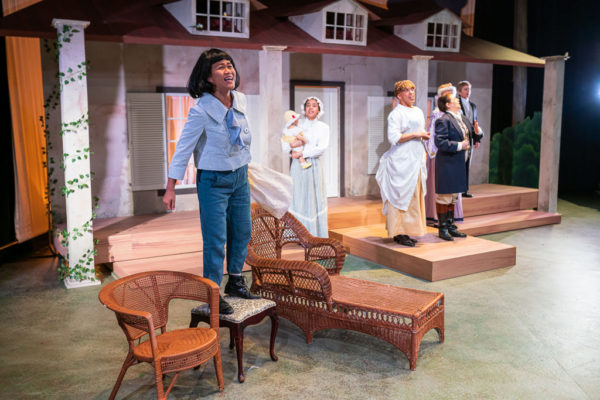Theater Review: A Raucous and Moving “Cloud 9”
By Christopher Caggiano
Expert performers and taut direction make this Cloud 9 a natural high.
Cloud 9 by Caryl Churchill. Directed by Lee Mikeska Gardner. Staged by the Nora Theatre Company at the Central Square Theater, 450 Massachusetts Avenue, Cambridge, MA, through June 30.

Sophorl Ngin (Edward), Aislinn Brophy (Ellen), Joshua Wolf Coleman (Betty), Stephanie Clayman (Clive), Kody Grassett (Maud), and Marge Dunn (Joshua) in the Nora Theatre Company production of “Cloud 9.” Photo: Nile Scott Studios.
Anyone looking for proof that you don’t have to travel to New York City or London to get first-rate theater should check out the Nora Theatre Company’s production of Caryl Churchill’s Cloud 9. Directed by Lee Mikeska Gardner, who is also the Nora’s artistic director, this is a production of what many consider to be a modern ‘classic’ that not only appreciates Churchill’s incisiveness on gender roles, but also the raucous humor inherent in the piece.
Even a casual theatergoer will likely be familiar with Cloud 9, Churchill’s 1979 exploration of gender identity in both British colonial Africa in the Victorian Age (act one) and contemporary London (act two). The show’s most salient characteristic is its nontraditional casting, with men playing women, women playing men, adults playing children, whites playing blacks, etcetera. What’s more, in act two the actors switch roles, creating fascinating shifts in power between the oppressor and the oppressed, the predator and the prey.
Act one of Cloud 9, especially under Gardner’s taut direction, is a delightful comedy of manners involving a British family living under threat of native uprising in Colonial Africa. As the action shifts among romantic and sexual couplings (everyone, it seems, is sleeping with everyone else), we experience a primer of sorts on the complications of class, gender, and power in the Victorian age. The gender-bending casting adds to the farcical nature of act one, but also as an alienation device regarding some of the less savory sexual proclivities (e.g. pedophilia).
The second act is a bit less focused, and considerably less farcical than act one, as we witness the repercussions of the action from the first act on the adult lives and progeny of the characters from act one. (Although the action fast-forwards a full century, the figures have only aged 25 years.) Churchill seems to be saying that, although culture has progressed significantly with respect to gender and power, repression still exists, albeit in a far more subtle form that has often been internalized. Churchill’s script makes this point diffusely, though Gardner’s production also seems to lose a bit of steam toward the end.
One of the marvels of Churchill’s writing is its economy. She crafts moments in synecdoche, evocative phrasing that haunts and tantalizes. This is especially true in the more serious second act. One character, Martin, speaks to his wife, Victoria, with the condescending confidence of a man who merely thinks he’s evolved. “Don’t cry again, Vicky,” he says. “I’m not the sort of man who makes women cry.” At another point, Victoria asks her mother, Betty, what Betty is frightened of: “Victoria, you always ask that as though there’s suddenly going to be an answer,” a surprisingly existential line that lingers long after the scene has finished.
The cast of Cloud 9 is as cohesive and individually strong as almost anything you could see in New York City. The character shifting the script calls for demands an adroitly versatile seven-member ensemble. And we have that here. Stephanie Clayman captures both the brusque bluster of the family patriarch in act one and the dithering wistfulness of the matriarch in act two. Whereas Joshua Wolf Coleman, who plays the mother in act one, is wonderfully layered and vibrant.
The most impressive transformation comes from Marge Dunn as Joshua, the African manservant in act one, then the lesbian lover of the daughter Victoria in act two. For most of act two, I honestly thought that Dunn was a different performer, one who actually hadn’t been present in the first act — eventually the shock of recognition set in. Yet one more pleasure supplied by Nora Theatre Company’s top-notch entertainment.
Christopher Caggiano is a writer and teacher based in Boston. He serves as Associate Professor of Theater at the Boston Conservatory at Berklee. His writing has appeared in American Theatre and Dramatics magazines, and on TheaterMania.com and ZEALnyc.com.
Tagged: Caryl Churchill, Christopher Caggiano, Cloud 9, Lee Mikeska Gardner

I’m so glad I read your review, which got me out to see the show right away. I love Churchill’s unique writing but some productions can be tenuous. This convinced me and I was not disappointed – hysterical and wonderfully acted. – a perfect play for the moment.
Happy to be of service. Yes, Cloud 9 can be a tough piece. I’ve seen more bad productions than good. Kudos to the Nora.